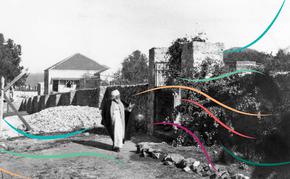The views expressed in our content reflect individual perspectives and do not represent the authoritative views of the Baha'i Faith.
Jesus Christ made the point that it’s easy to love the people who love us and who treat us well—the test of our faith is how we deal with people who don’t treat us well:
But I say to you who hear: Love your enemies, do good to those who hate you, bless those who curse you, and pray for those who spitefully use you. To him who strikes you on the one cheek, offer the other also. And from him who takes away your cloak, do not withhold your tunic either. Give to everyone who asks of you. And from him who takes away your goods do not ask them back. And just as you want men to do to you, you also do to them likewise. — Jesus Christ, Luke 6:27-31
We began this journey with an anti-theist sharing, on an atheist forum, her mocking use of a nativity scene her in-laws had given her family. The offenders had not ”spitefully used” their daughter-in-law, but had given what, to them, was a meaningful gift. According to the original poster, her in-laws expressed hurt at the mockery. She claimed not to understand their hurt and argued that she wasn’t mocking them, but only their Holy Book and beliefs. According to her own beliefs, her actions could not possibly have harmed them in any way.
Here is the crux of the matter: an atheist’s disbelief in God comes with no code of ethics—no official goalposts. A Christian’s belief (or a Buddhist’s or a Jew’s or a Muslim’s or a Baha’i’s) does come with such a code. Christ presses his disciples to love even their enemies and to return evil with good. He goes so far as to make this the lynchpin of eternal life in that famous Parable of the Good Samaritan—which every Christian knows, but far fewer understand. Here, I speak from my own prior experience as a churchgoing Christian in a nominally Christian society.
This is not to say that the code of faith is always followed. Showing love for one’s neighbors—let alone one’s inveterate enemies, as in the Parable—is hard. Christ said as much:
Therefore, whatever you want men to do to you, do also to them, for this is the Law and the Prophets. Enter by the narrow gate … Because narrow is the gate and difficult is the way which leads to life, and there are few who find it. — Jesus Christ, Matthew 7:11-14 (emphasis added)
Here, Christ defined the ”narrow gate” as how well believers follow what we have come to call the Golden Rule. The history of the Christian church demonstrates just how narrow that gate is. Few of us live by Christ’s words—even those of us who ostensibly believe in those words as divine—but most readers would agree that we could avoid a lot of grief if more of us did live by them.
The spiritual and moral code laid down in the revealed scriptures of the world forms both a starting point and a goal. If we fail to fix on that point or work toward that goal, the fault is our own. We allow the Golden Rule to be trumped again and again by political, economic and personal considerations. Scripture has given us goalposts and we continually move them for our own convenience. In the Baha’i teachings, Baha’u’llah not only restated the goal, but suggested how we might reach it:
It is Our wish and desire that every one of you may become a source of all goodness unto men, and an example of uprightness to mankind. Beware lest ye prefer yourselves above your neighbors. Fix your gaze upon Him Who is the Temple of God amongst men. He, in truth, hath offered up His life as a ransom for the redemption of the world. … If any differences arise amongst you, behold Me standing before your face, and overlook the faults of one another for My name’s sake and as a token of your love for My manifest and resplendent Cause. – Gleanings from the Writings of Baha’u’llah, p. 315.
I don’t expect everyone to relate to that—merely to understand that it’s more than a pretty sentiment. As I said, it’s easy to love people who are in your tribe. In my experience, the teachings of my Faith offer both a reason and a means to expand that tribe to include others, even “enemies.”
Consider the very real problems we face. If I apply the teachings of my Faith about human oneness to healthcare or immigration reform, say, or to how I would react to being terrorized or imprisoned for my Faith (as the Baha’is in Iran and Yemen are), I begin at a different starting point than many people I’ve observed—religious or not. I begin from the premise that we really are one family, that there is no them and us, but only us.
If I take seriously the idea that I can, for the love of God, actually love people who wish me ill, I stand a chance of not perpetuating the sort of tit for tat we see on a huge scale in places like Palestine or Iraq … or online:
Then one of them, a lawyer, asked Him a question, testing Him, and saying, ‘Teacher, which is the great commandment in the law?
Jesus said to him, ‘You shall love the Lord your God with all your heart, with all your soul, and with all your mind.’ This is the first and great commandment. And the second is like it: ‘You shall love your neighbor as yourself.’ On these two commandments hang all the Law and the Prophets.’ — Jesus Christ, Matthew 22:35-40
These words can change the course of our shared journey … if we let them.

















Comments
Sign in or create an account
Continue with Facebookor